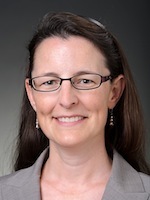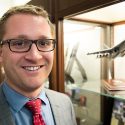Crone set to guide Graduate School into new era
As the Graduate School and the Office of Vice Chancellor for Research and Graduate Education set sail into a new era, Interim Graduate School Dean Wendy Crone is taking stock of graduate education and mapping out a strategy to best support the interests of UW–Madison’s 9,000 graduate students and their faculty mentors.

Wendy Crone
A professor of engineering physics, Crone is entering uncharted territory. As the administrative revisions in the UW–Madison graduate education and research programs manifest themselves, the changes will pose both challenges and opportunities for students, faculty and staff. The ongoing division of responsibilities between the Graduate School and the VCRGE will also generate many questions from the university community.
Crone previously served as associate Graduate School dean for graduate education. Her experiences both as a faculty member and administrator will help as she begins the process of implementing significant administrative change to a landscape that has enjoyed much continuity through the years. This past week, Crone took time to answer a few questions about the mission and priorities of the Graduate School in its new configuration.
What are your top priorities in setting a new or renewed course for the Graduate School?
My initial priority for the Graduate School is to enact the basic principles that were identified in the restructuring conversations of last academic year. Although there was substantial discussion regarding the new structure itself, there was widespread agreement about its underlying goals. These include increased funding for graduate education, particularly funding support for graduate students, and increased rankings of our graduate programs. Just as importantly, there is widespread agreement on the need to maintain strong integration between graduate education and research.
These priorities are best served by a strong Graduate School, which has the leadership and resources to perform its functions and to advocate on behalf of graduate education at the university and national levels. The Graduate School currently oversees roughly 150 graduate programs, and assists them in providing over 9,000 graduate students with the knowledge and experience to go on to lead and advance their fields in a wide range of career paths that include academic, research, teaching, nonprofit, government, arts, business, industry, and entrepreneurial ventures.
“As we revise our processes and priorities, this linkage between research and graduate education will be integral to the way we do our work.”
Wendy Crone
Because excellence in research and graduate education is the cornerstone of our university, we need to ensure the support of graduate students and graduate programs, both financially and developmentally. Graduate students are an essential part of the institution and graduate education is integral to several university-wide goals. In addition to their own individual advancement through their graduate studies, our students play central roles in both the research and undergraduate education missions of the institution. Funding provided by the Wisconsin Alumni Research Foundation has greatly enhanced graduate education on campus, via several funding mechanisms including fellowships.
Continued adaptation will be required to appropriately respond to the rapidly changing landscape of research and graduate education. Because the dean of the graduate school reports to the vice chancellor for research and graduate education, we will retain the integration of research and graduate education that has been the hallmark of our campus. As we revise our processes and priorities, this linkage between research and graduate education will be integral to the way we do our work.
We have begun the process of restructuring, but much of the implementation detail is still to be worked out. We will be launching a faculty committee to further engage with campus stakeholders, including graduate students, to identify priorities that we must focus on and opportunities for the future.
What have been the biggest challenges you are encountering?
We have a number of opportunities to reshape facets of graduate education on our campus. The biggest challenge is the ongoing task of balancing the needs of students and programs with the available resources. We will continue to work with our campus partners to understand needs, work with our various advisory groups to identify priorities and crucial activities, and work to maximize the resources available to address these issues.
What do you see as opportunities that the new VCRGE/Graduate structure can address right out of the gate?
While research and graduate education remain linked, there is now a clearer division of duties between the Graduate School and the Office of the Vice Chancellor for Research and Graduate Education. In the new Graduate School, we now have the opportunity to focus on the success of graduate students and graduate programs. In a higher education landscape that continues to evolve, graduate programs must be able to adapt and innovate to meet the changing needs of their fields and their students. The new Graduate School will re-emphasize our collaboration with faculty and key campus partners to prepare graduate students to be thought leaders within their fields and provide them with transferable skills and breadth beyond their primary area of expertise that will bolster their long-term success. We will continue to seek the feedback of our graduate students, directors of graduate study, graduate program coordinators, and faculty and staff colleagues throughout the implementation of the restructuring.
Have these kinds of administrative splits occurred at other institutions? If so, how have those worked? What can we learn from those models?
Where it has been successful is in the places where the Graduate School has been appropriately resourced and maintained its leadership capabilities. Wisconsin in many ways is unique, so we have to navigate this restructuring within the landscape of our own institution, but we can learn from other institutions and the ways they have made this work successfully. Many other institutions have made the split, some very successfully and some less so. My goal is to make our Graduate School strong and enduring.
If there is one thing you think a faculty or staff member should know about the new structure, what would that be?
The Graduate School’s core mission to foster excellence in graduate education remains unchanged, while our integration with the research mission of the university is preserved. The Graduate School will continue its oversight of the administration and funding of graduate education and it will continue to be the home of graduate programs across campus. We rely on our institution’s excellent graduate faculty to mentor graduate students and to maintain the excellence of our graduate programs. The graduate faculty continue to be represented through the shared governance of the Graduate Faculty Executive Committee and the Graduate School Academic Planning Council, which are both chaired by the dean of the Graduate School. Research compliance, research policy, and the centers previously in the Graduate School are now in the Office of the Vice Chancellor for Research and Graduate Education.



